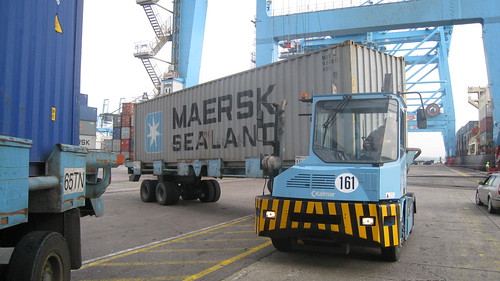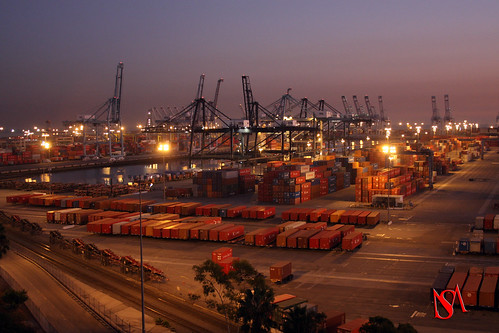Port of Long Beach gets greener and greener! Starts Testing Plug-In Hybrid Electric Terminal Tractor
(Source: Green Car Congress & GreenTechMedia)
A plug-in parallel hybrid electric terminal tractor used to move shipping containers and cargo within the port will be tested at a Port of Long Beach shipping terminal. The Electric Power Research Institute (EPRI) is coordinating the project among several ports and will also compile and analyze project data related to the tractor’s performance, including emissions, charging, diesel fuel reduction and other aspects.
Terminal tractors – vehicles that move massive cargo loads at seaports around the world – spend up to four-fifths of their time sitting still with their engines running, waiting to be put to use. Given that fact, why not retrofit the prevalent diesel-burning versions to make them plug-in hybrids?
US Hybrid Corporation performed the conversion which uses a 33 kWh Li-ion battery pack from GAIA. The truck is equipped with a 6.6 kW charger. EPRI expects the plug-in to have about 4 hours of electric operation, depending upon the duty cycle, said Andra Rogers, senior project manager of Electric Transportation at EPRI.
The equipment will be tested at SSA Container Terminal on Pier A at the Port of Long Beach for 3 months.
As a plug-in hybrid electric vehicle (PHEV) the tractor will be able to move containers weighing up to 95,000 pounds as its diesel counterparts can, but unlike diesels will not idle its engine when inactive. Over a year of full-time operation it is expected that the PHEV tractor would use 3,000 gallons of fuel per year less than a similar diesel and significantly reduce emissions.
It costs about $80,000 to convert a diesel terminal tractor to a plug-in hybrid, but a converted tractor will save about 80 percent of its fuel usage, or about 3,000 gallons of diesel a year, giving it a payback of about six years, EPRI estimates.
Ports, and the shipping industry they serve, aren’t as publicly visible sources of pollution as on-road cars and trucks. But the global shipping industry accounts for a significant share of the world’s greenhouse-gas emissions – about 4.5 percent, according to a U.N. study reported by the Guardian newspaper last year.
Only a fraction of that can be contributed to on-shore activity at ports. Still, ports have been linked to high levels of pollution and contamination of nearby communities, and that’s led to government and industry action to clean them up, such as a $28 million project at the Port of Oakland, Calif. aimed at cutting diesel truck emission by up to 85 percent, the San Francisco Chronicle reported last month.
The three-month Port of Long Beach demonstration project is part of a one-year demonstration, during which the tractor will also be tested and evaluated at ports in Savannah, Ga., Mobile, Ala., Houston, and New York City.
Click here to read the entire article.


